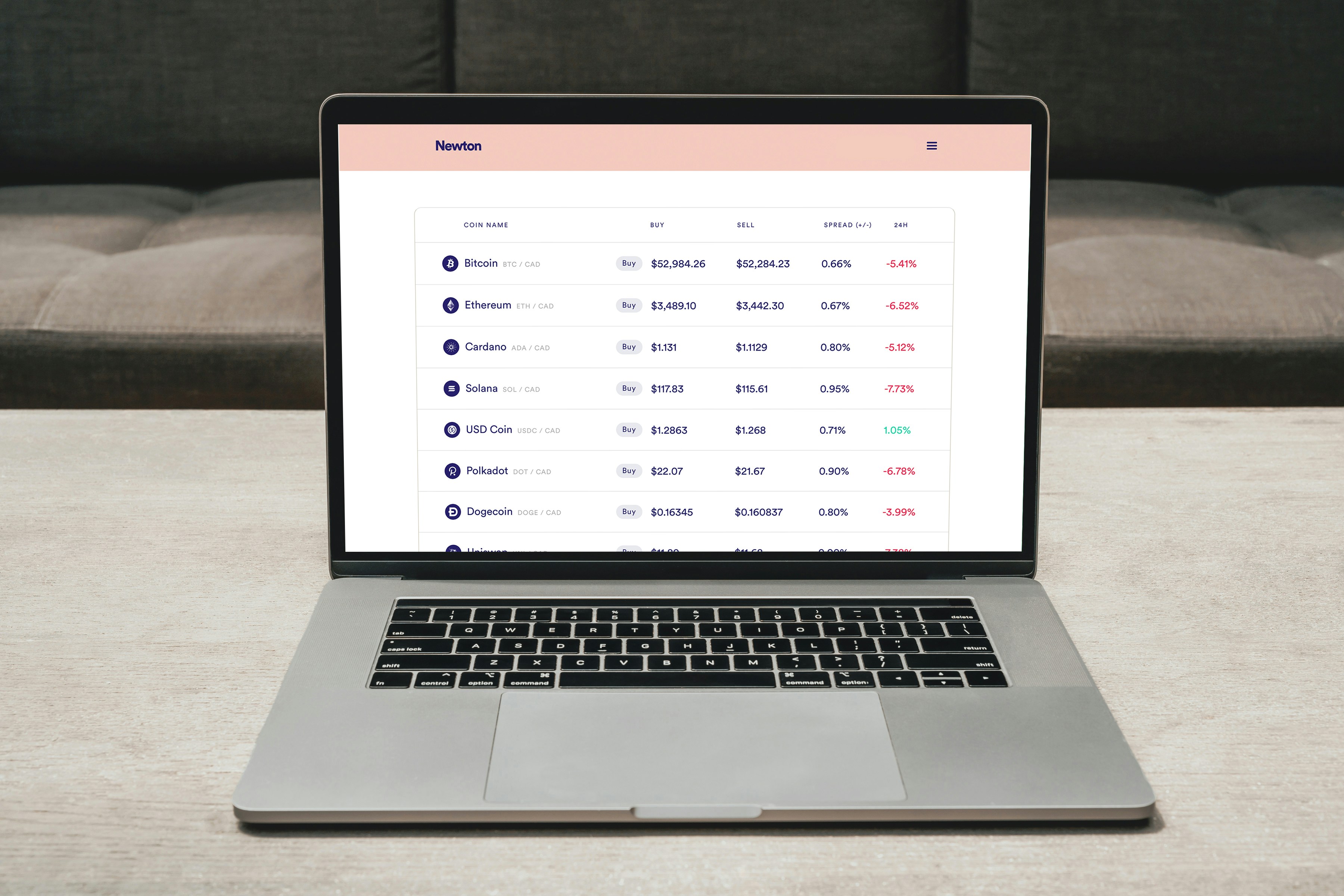
Introduction to Digital Assets
Digital assets represent a rapidly evolving class of financial instruments that have gained significant traction in recent years. These assets are essentially any asset that is stored, transferred, or recorded electronically, typically utilizing blockchain technology. Digital assets encompass a variety of forms, including cryptocurrencies, tokens, and digital representations of real-world assets such as real estate or stocks. Their rise can be attributed to the transition from traditional finance to a more decentralized model, which is increasingly appealing to investors looking for innovative ways to grow their portfolios.
The significance of digital assets lies in their potential to democratize access to investment opportunities and enhance financial inclusivity. With the rise of crypto trading platforms, anyone with an internet connection can engage in the market, breaking down barriers that previously existed in traditional finance. Additionally, digital assets often provide advantages in terms of liquidity, transparency, and security, critical factors that have contributed to their growing popularity among investors. The shift towards digital assets has seen a notable increase in institutional adoption, further validating their role in the financial ecosystem.
Over the years, digital assets have evolved considerably. Initially, the sector was dominated by Bitcoin, the first and most widely recognized cryptocurrency. However, the emergence of Ethereum and other altcoins has diversified the market significantly, introducing new mechanisms and use cases. Non-fungible tokens (NFTs) have also emerged, creating unique opportunities for digital artists and collectors. Fidelity’s foray into crypto has played a critical role in legitimizing digital assets within the traditional financial landscape, showcasing a path that emphasizes innovation while addressing regulatory requirements.
As we delve deeper into this blog post, we will explore how Fidelity is pioneering new investment strategies to navigate this complex yet exciting domain of fidelity crypto and its growing influence on the future of finance.
The Role of Fidelity in Crypto Investing
Fidelity Investments, a stalwart in the realm of traditional finance, has made substantial strides into the landscape of digital assets, responding to the growing investor interest in cryptocurrencies. The company’s entry into the crypto market signals a pivotal shift in how established financial institutions perceive and engage with blockchain technology and its associated assets. Observing the rising demand for cryptocurrency exposure, Fidelity recognized an opportunity to not only diversify its services but also to bolster its reputation as an innovator in financial services.
Historically, Fidelity has been a frontrunner in integrating technology with investment services. Its foray into crypto investing is a continuation of this ethos, driven by a strategic imperative to remain competitive in a rapidly evolving market. As more institutional investors show interest in digital currencies, Fidelity’s leadership saw the necessity to offer solutions that facilitate hassle-free access to cryptocurrencies. This decision aligns with a broader industry trend where traditional financial firms are beginning to acknowledge the integral role digital assets are likely to play in future portfolios.
To position itself effectively within the blockchain ecosystem, Fidelity has undertaken several strategic initiatives. These initiatives include the launch of Fidelity Digital Assets, which provides custody solutions and trade execution services for institutional clients engaging with cryptocurrencies. Additionally, Fidelity is actively educating its client base about the opportunities and risks associated with cryptocurrency investments, creating a robust framework that combines traditional investment rigor with the dynamism of digital assets. By doing so, Fidelity is nurturing a sense of trust and confidence in an investment space often characterized by volatility and uncertainty.
This proactive involvement in cryptocurrency signals Fidelity’s commitment to being a pioneer in the evolving investment landscape. As the world of digital assets continues to mature, the role of Fidelity in shaping crypto investing practices will likely become even more pronounced, ultimately influencing how investors engage with fidelity crypto and its derivatives.
Fidelity’s Innovations and Offerings
In the rapidly evolving landscape of digital assets, Fidelity has established itself as a pivotal player by introducing a suite of innovative services tailored for crypto investing. One of the cornerstone offerings is their comprehensive custody services. Recognizing the importance of security in managing digital assets, Fidelity provides institutional-grade custody solutions that ensure strict regulatory compliance and enhanced protection against potential cyber threats. This commitment to safety is a significant differentiator, particularly when juxtaposed with other players in the market.
Additionally, Fidelity has developed sophisticated trading platforms that facilitate seamless transactions in the crypto space. These platforms are designed not only to cater to seasoned investors but also to accommodate newcomers to the digital asset market. By combining user-friendly features with advanced trading options, Fidelity empowers individuals and institutions alike to engage in crypto investing with confidence. The integration of various cryptocurrencies into their trading platform is another aspect that sets Fidelity apart, providing users with diverse options to expand their portfolios.
Moreover, Fidelity recognizes the importance of investor education in promoting informed decision-making within the crypto sphere. To this end, it offers a range of educational resources, including webinars, articles, and market analysis, aimed at empowering investors with the knowledge necessary to navigate the complexities of fidelity crypto investments. These resources not only clarify the intricacies associated with digital assets but also foster a greater understanding of risk management strategies. Thus, by offering a combination of custody services, advanced trading platforms, and educational insights, Fidelity distinctively positions itself as a leader in the digital asset domain.
Regulatory Landscape and Compliance
The regulatory environment surrounding digital assets has become increasingly complex as governments and regulatory bodies strive to create frameworks that ensure security and compliance within the crypto space. The rise of cryptocurrencies and blockchain technology has prompted a re-evaluation of existing regulations, leading to the development of new guidelines designed to foster innovation while protecting investors. Fidelity is actively engaging in this evolving landscape, working to ensure its operations within the realm of fidelity crypto adhere to these emerging regulatory standards.
At the core of Fidelity’s approach to crypto investing is a strong commitment to compliance. This commitment includes a rigorous understanding of anti-money laundering (AML) and know-your-customer (KYC) regulations, which are essential in mitigating risks associated with digital transactions. Fidelity ensures that all transactions executed on its platform meet these regulatory requirements, thereby reinforcing its reputation as a trustworthy player within the fidelity crypto ecosystem. By prioritizing compliance, Fidelity demonstrates that it values the protection of its clients’ interests and promotes a stable environment for digital asset investments.
Furthermore, Fidelity is at the forefront of advocating for clearer regulations in the cryptocurrency space. By participating in discussions with regulators and industry stakeholders, Fidelity helps to shape policies that provide a balanced approach to innovation and security. Its proactive stance on regulatory matters not only protects its clients but also serves to enhance the overall credibility of the crypto market. As fidelity crypto continues to capture the attention of both institutional and retail investors, Fidelity’s commitment to compliance will likely play a significant role in shaping the future of digital asset investing.
Impact on Institutional Investors
The increasing participation of institutional investors in the cryptocurrency market marks a significant evolution in the digital asset landscape. Fidelity, a well-regarded player in the financial services industry, has been at the forefront of this movement, facilitating a more inclusive environment for institutional engagement. Their approach not only demonstrates confidence in the future of digital currencies but also positions them as a reputable intermediary within this nascent sector.
One way Fidelity is attracting major players into the cryptocurrency arena is through the development of secure custodial solutions tailored for institutional needs. This commitment to security reassures larger organizations that their investments in cryptocurrencies will be managed with the same level of reliability as traditional assets. Moreover, Fidelity’s offerings—such as crypto investment funds and trading capabilities—provide a structured framework that promotes confidence among institutional investors hesitant to enter the relatively young digital asset market.
The participation of firms like Fidelity is contributing to the maturation of the market. Institutional investment not only increases liquidity but also establishes a level of professionalism previously lacking in the crypto space. The involvement of major financial institutions helps to cultivate trust, which is essential for onboarding more conservative investors who may have previously shied away from cryptocurrency due to its inherent volatility and lack of regulation.
This shift in perception is further enhanced by Fidelity’s ongoing educational efforts, aimed at demystifying the complexities of cryptocurrencies and blockchain technology. By offering resources and insights into the digital asset ecosystem, Fidelity is helping to ensure that institutional investors are well-informed participants. As more organizations recognize the potential of digital assets, driven in part by Fidelity’s leadership, the overall market sentiment is shifting positively, paving the way for a more stable and respected cryptocurrency landscape.
Future Trends in Crypto Investing
The landscape of crypto investing is poised for substantial changes, especially with major players like Fidelity entering the arena. One of the primary trends likely to emerge is the advancement of technology in trading platforms. These advancements may include the integration of artificial intelligence and machine learning algorithms to optimize trading strategies. As Fidelity crypto initiatives gain momentum, we can expect sophisticated tools that assist investors in making informed decisions more rapidly and accurately. Furthermore, blockchain technology will likely evolve, improving security and transaction speed, thereby enhancing user trust in the cryptocurrency market.
Another trend on the horizon involves changing investor demographics. Historically, crypto investing has appealed primarily to younger audiences, particularly millennials and Gen Z. However, with Fidelity’s outreach efforts, a broader range of investors from various age groups and backgrounds may begin to participate in cryptocurrency markets. This shift could lead to increased capital inflows as traditional investors, including those in retirement planning, gain confidence in the legitimacy of digital assets. Offering educational resources and accessible platforms will be essential to catering to this evolving demographic and nurturing a more diverse investing community.
In addition to technological advancements and shifting demographics, we may witness the emergence of new asset classes within the cryptocurrency realm. Fidelity’s commitment to providing a range of investment options could inspire the development of hybrid assets that combine elements of traditional finance with decentralized finance (DeFi). These new asset classes could include tokenized real estate, non-fungible tokens (NFTs) representing unique digital assets, and even income-generating tokens that appeal to mainstream investors. Together, these factors are shaping a more robust and dynamic future for crypto investing, fundamentally altering the way individuals perceive and engage with digital assets.
Challenges and Risks of Digital Assets
The landscape of digital assets presents numerous challenges and risks that investors must acknowledge before delving into this emerging market. Market volatility stands out as one of the primary concerns, as the values of cryptocurrencies often fluctuate dramatically in short periods. This unpredictability can lead to substantial financial losses, making it essential for investors to have a firm grasp of market dynamics and the factors influencing price movements when managing their fidelity crypto investments.
Another critical risk associated with digital assets is the security of transactions and holdings. Cybersecurity threats, including hacking and phishing attacks, pose significant dangers to investors’ assets. Many individuals lack sufficient knowledge regarding best practices for securing their digital wallets and private keys. The increasing frequency of security breaches highlights the necessity for robust protective measures in the realm of digital currencies.
Furthermore, the potential for regulatory changes adds an additional layer of uncertainty. As governments and financial institutions grapple with how to approach digital currencies, investors must remain vigilant about potential alterations in regulations that could impact their investments. Regulatory frameworks are still in their infancy, and any significant changes could affect the viability and acceptance of specific cryptocurrencies within the market.
Fidelity recognizes these challenges and is committed to mitigating associated risks for its clients. By implementing advanced security protocols and continuously educating investors on best practices, Fidelity aims to enhance the safety of their fidelity crypto investments. Additionally, the firm actively engages in dialogue with regulators to stay informed about changing landscapes, anticipating potential impacts on the market. This proactive approach ensures that investors can navigate the evolving world of digital assets while minimizing their exposure to inherent risks.
Case Studies: Fidelity’s Success Stories
Fidelity has consistently positioned itself at the forefront of the digital asset revolution, providing innovative solutions that facilitate both individual and institutional crypto investing. One noteworthy case study involves the launch of Fidelity Digital Assets in 2018. This platform was instrumental for institutions to securely store and trade cryptocurrencies. By leveraging its well-established reputation in financial services, Fidelity reassured potential investors about the legitimacy and security of digital assets. The impact of this service was immediate, with several high-profile clients integrating Fidelity’s custodial solutions into their investment strategies, resulting in enhanced liquidity and market engagement.
Another compelling example is Fidelity’s collaboration with various institutional investors to develop tailored investment strategies in the crypto space. One such case involved a hedge fund specializing in digital assets, which sought Fidelity’s expertise in navigating regulatory hurdles and risk management. Through a structured approach, Fidelity provided comprehensive market analysis and insights, allowing the hedge fund to make informed investment decisions. This partnership not only enhanced the hedge fund’s operational efficiency but also solidified Fidelity’s role as a trusted advisor in the evolving landscape of crypto investing.
Furthermore, in 2021, Fidelity’s diversification initiatives attracted significant attention when they introduced Bitcoin as an investment option within their retirement plans. This strategic move opened the doors for a broader demographic to access digital assets as part of their long-term financial strategy. The decision was met with enthusiasm from both clients and analysts, marking a pivotal shift in retirement planning. By integrating fidelity crypto options into traditional investment vehicles, Fidelity has set a precedent that underscores the growing acceptance of digital assets in various financial contexts.
Overall, these case studies exemplify Fidelity’s commitment to fostering positive engagement within the crypto investing realm. As the market continues to evolve, Fidelity’s innovative strategies and solutions will likely play a crucial role in shaping the future of digital assets.
Conclusion: The Way Forward
As we explore the evolving landscape of digital assets, it is evident that Fidelity is playing a transformative role in crypto investing. The firm has not only embraced the rapidly growing market but has also set a precedent in providing robust investment solutions that enhance accessibility and security for investors. By pioneering initiatives that cater to both institutional and retail investors, Fidelity crypto is redefining how individuals and organizations perceive and engage with cryptocurrencies.
The implications of Fidelity’s involvement in the cryptocurrency space extend far beyond just providing investment platforms. Their commitment to educating investors about digital assets and promoting responsible investing practices is essential in building trust and credibility in this budding market. As Fidelity continues to innovate, we can expect a shift in market sentiment, encouraging broader adoption and acceptance of digital assets across various sectors.
Looking ahead, the future trajectory of digital assets will likely be marked by increased regulatory clarity and integration into traditional financial systems, partly due to the influence of established players like Fidelity. This could pave the way for more sophisticated investment products and strategies, allowing investors to leverage the potential of cryptocurrencies while mitigating risks. The combination of Fidelity’s market presence and their emphasis on technology and security ensures that the investment landscape will continue to evolve, making digital assets an integral part of portfolios moving forward.
In conclusion, Fidelity’s strategic approach and innovative offerings position it as a pivotal force in the crypto investment realm. As both institutional and individual investors navigate this transformative phase, Fidelity crypto stands at the forefront, shaping the future of digital assets and setting the stage for responsible and informed investing practices.



